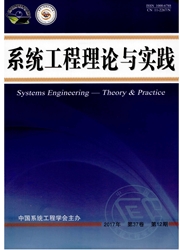

 中文摘要:
中文摘要:
提高能源效率是降低居民生活能源消费的一个重要途径,而由技术进步引起的能源回弹效应的大小直接关系到能效政策实施的有效性.在简要分析回顾能源消费直接回弹效应的主要理论和估算方法的基础上,以1996-2011年中国30个省区的面板数据,建立双对数模型与误差修正模型,对中国城镇居民用电的回弹效应进行了实证分析.结果表明中国城镇居民用电存在明显的部分回弹效应,且长期回弹效应为0.7l,短期回弹效应为0.47.大部分由效率提高所带来的能源节约都由于回弹效应的存在被抵消,回弹效应的存在减小了能效政策的实施效果,因此中国政府在制定能效政策时有必要制定相应的措施来控制和减小能源回弹效应.
 英文摘要:
英文摘要:
Improving energy efficiency is an important approach to decrease energy consumption, andthe magnitude of energy rebound effect caused by technology progress directly affects the effectiveness ofenergy effect policies. This paper briefly reviews the main theory of energy rebound effect, with China's 30provincial government panel data from 1996 to 2011, builds a double logarithm and a panel error correctionmodel to empirically anMyze the direct rebound effect of urban residential electricity use. The results showthat the Chinese urban residential electricity consumption exists a partial rebound effect, and the long-term rebound effect is 0.71, the shortterm rebound effect is 0.47. A majority of the expected reduction inurban residentiM electricity consumption from efficiency improvement could be offset due to the existenceof rebound effect. The rebound effect impairs the functions of energy efficiency policies, and therefore theChinese government should take the effect into consideration when formulating energy policies.
 同期刊论文项目
同期刊论文项目
 同项目期刊论文
同项目期刊论文
 Inter-firm collaborations on carbon emission reduction within industrial chains in China: practices,
Inter-firm collaborations on carbon emission reduction within industrial chains in China: practices, Determinants and policy implications for household electricity-saving behaviour: Evidence from Beiji
Determinants and policy implications for household electricity-saving behaviour: Evidence from Beiji Two-echelon Inventory optimization with Service Level Constraint and Sensitive Controllable Lead Tim
Two-echelon Inventory optimization with Service Level Constraint and Sensitive Controllable Lead Tim How carbon offsetting scheme impacts the duopoly output in production and abatement: analysis in the
How carbon offsetting scheme impacts the duopoly output in production and abatement: analysis in the Sources of production inefficiency and productivity growth in China: A global data envelopment analy
Sources of production inefficiency and productivity growth in China: A global data envelopment analy Delinking indicators on regional industry development and carbon emissions: Beijing–Tianjin–Hebei ec
Delinking indicators on regional industry development and carbon emissions: Beijing–Tianjin–Hebei ec Determinants of the increased CO2 emission and adaption strategy in Chinese energy-intensive industr
Determinants of the increased CO2 emission and adaption strategy in Chinese energy-intensive industr Determinants of behavioural intention for residential energy-saving in Beijing: A view of extended t
Determinants of behavioural intention for residential energy-saving in Beijing: A view of extended t Measurement of energy rebound effect in households: evidence from residential electricity consumptio
Measurement of energy rebound effect in households: evidence from residential electricity consumptio Features andinfluencing factors of carbon emissions indicators in the perspective ofresidential cons
Features andinfluencing factors of carbon emissions indicators in the perspective ofresidential cons A performance evaluation of the energy, environmental, and economic efficiency and productivity in C
A performance evaluation of the energy, environmental, and economic efficiency and productivity in C Carbon emissions calculation from municipal solid waste and the influencing factors analysis in Chin
Carbon emissions calculation from municipal solid waste and the influencing factors analysis in Chin 期刊信息
期刊信息
